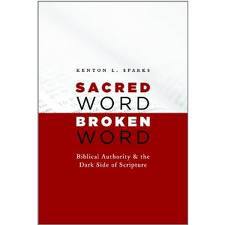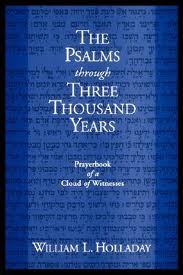 Today we look at chapter 5 of Kent Sparks’s Sacred Word, Broken Word: Biblical Authority and the Dark Side of Scripture
Today we look at chapter 5 of Kent Sparks’s Sacred Word, Broken Word: Biblical Authority and the Dark Side of Scripture. Sparks is professor of Old Testament and interim provost at Eastern University, St. Davids PA. The first post of the series can be found here.
The chapter is entitled “The Brokenness of Scripture,” and in it Sparks further clarifies ideas he has been developing since the beginning of the book.
Following his remarks on God’s violence in chapter 4, Sparks asks:
But is it not a very deep paradox that the Shoah, in which Nazis systematically exterminated the Jews because of their religion and ethnicity, is mirrored so vividly by the Deuteronomic ban in Jewish Scripture, according to which Israel exterminated the Canaanites because of their religion? (p. 45).
Clearly, Sparks is not swayed to defend the issue by saying that God can kill Canaanites anytime he wants, and how dare you suggest in any way that it is comparable to the Holocaust.
For Sparks, a better way forward is to admit that Scripture here is theologically problematic, and he repeats his analogy that Scripture is “broken” as is creation. Remember for Sparks Scripture is part of fallen creation, not above it; even though it is inspired, it is still written by fallen men and so exhibits effects of the fall.
Just as God’s good and beautiful creation stands in need of redemption, so Scripture–as God’s word written within and in relation to that creation, by finite fallen beings–stands in need of redemption (p. 46)
Some might respond that you can’t compare creation and Scripture like this, complaining that Sparks fails to make the distinction between general revelation (creation) and special revelation (Scripture); the former is subject to the fall, the latter is preserved from it.
Sparks does not address this directly, but if I may channel my inner Sparks, I would imagine he would say something like this:
“This distinction between general and special revelation comes in handy, certainly, but on what basis do you feel you can separate Scripture out from the rest of the created and fallen world? In other words, how do you know this is a valid theological distinction to make?”
“This distinction may make for an interesting discussion in the abstract, that is, until you begin dealing with the details of Scripture that don’t seem to work with this same distinction.”
At any rate, if Scripture bears the effects of the fall like creation, Sparks continues, “the church should not defend Scripture’s uniqueness as the divine word by appealing to its perfection. Rather a proper account of Scripture’s goodness and divine origins will closely follow the traditional Christian response to the problem of evil” (my emphasis; p. 47).
By this, Sparks argues that the church has to discern what in Scripture is marred by the fall just as the church makes those same judgments of creation:
Both humanity and Scripture are God’s good works and serve in his redemptive work. And though this is true, both are marred by the effects of the Fall. The presence in Scripture of this distortion no more compromises its status as God’s word than the distortion in humanity compromises its status as God’s creation (p. 47).
Sparks also points out, citing William Holladay’s The Psalms Through Three  Thousand Years
Thousand Years, that the church has been making these sorts of decisions all along anyway, for example when liturgies omit passages that are “harsh in tone.”
All of this raises the question how Scripture can retain any notion of authority. Sparks concludes the chapter by promising to address this in the pages to follow. He hints, “Any workable solution will require some manner of ordering the Bible’s diversity, so that we give priority to biblical texts that speak with more clarity and deeper theological logic than those that are more partial or distorted by the human condition” (p. 49).
Challenging ideas, not doubt, but Sparks is addressing head on the Christian paradox of Scripture, that it is theologically foundational while also posing a theological problem. Alternate proposals would need to come to terms with Scripture as Sparks is trying to do.
